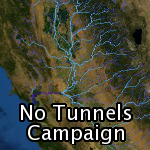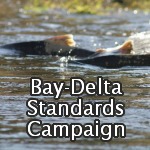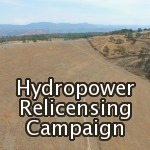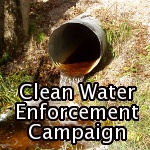On 6 May 2014, the State Water Resources Control Board (State Board) held an informal workshop on the latest changes to water quality and flow standards established to protect public trust resources in the Bay-Delta estuary. The Board, on 2 May 2014, again weakened existing standards that already provided for critically dry years situations. Specifically, in response to a request from water exporters, the Board reduced Delta outflow by a third, moved the salinity compliance point from Emmaton upstream to Three Mile Slough and allowed a one-to-one export of San Joaquin River pulse flows.
CSPA observed that the newly reduced standards will have a devastating impact on listed species already suffering from decades of chronic violations and mismanagement. Decreased outflow will draw the low salinity zone upstream; reduce critical habitat for longfin and Delta smelt; subject smelt to increased entrainment and lethal water temperatures, impair food chain production; lower turbidity and increase predation; reduce migration cues for salmon and steelhead, and vastly expand the range of invasive non-native clams and noxious weeds. Allowing a 1:1 export of water transfers and the San Joaquin River pulse flow, along with the shift of exports to the Tracy (Jones) pumping plant will severely reduce survival of San Joaquin salmon and steelhead by eliminating their freshwater migration corridor through the Delta from April through June. Together, the impacts will likely result in population crashes and regime shifts that will plague the estuary for decades to come.
CSPA pointed out that drought occurs 40% of the time in California and that the drought became a crisis because of egregious mismanagement by the state and federal water projects (Projects). The Projects simply export far too much water during sequential dry years. Over the last 40 years, the State Board’s first response to dry conditions has been to ignore or waive violations of water quality and flow standards. In fact, the State Board has never commenced an enforcement action against the Projects for thousands of documented violations.
Generally, the State Board simply declines to enforce violations of Delta standards. This year it has modified the standards 8 times in the last 91 days or about once every 11 days. It has done so in a closed-door backroom process that by design excludes the public. It has refused to respond to an avalanche of protests or schedule formal hearings, as required by law. Informal workshops are not acceptable surrogates for formal evidentiary proceedings.
CSPA blasted the State Board’s pattern and practice of waiving promulgated regulations, ignoring serial violations of standards and subverting public involvement. This mockery of law should be the subject of a grand jury or criminal investigation by a district attorney.
One thing is painfully clear: there are no promises, guarantees or assurances regarding Bay-Delta protection that are worth the paper they’re written on. That doubly applies when it comes to BDCP.









